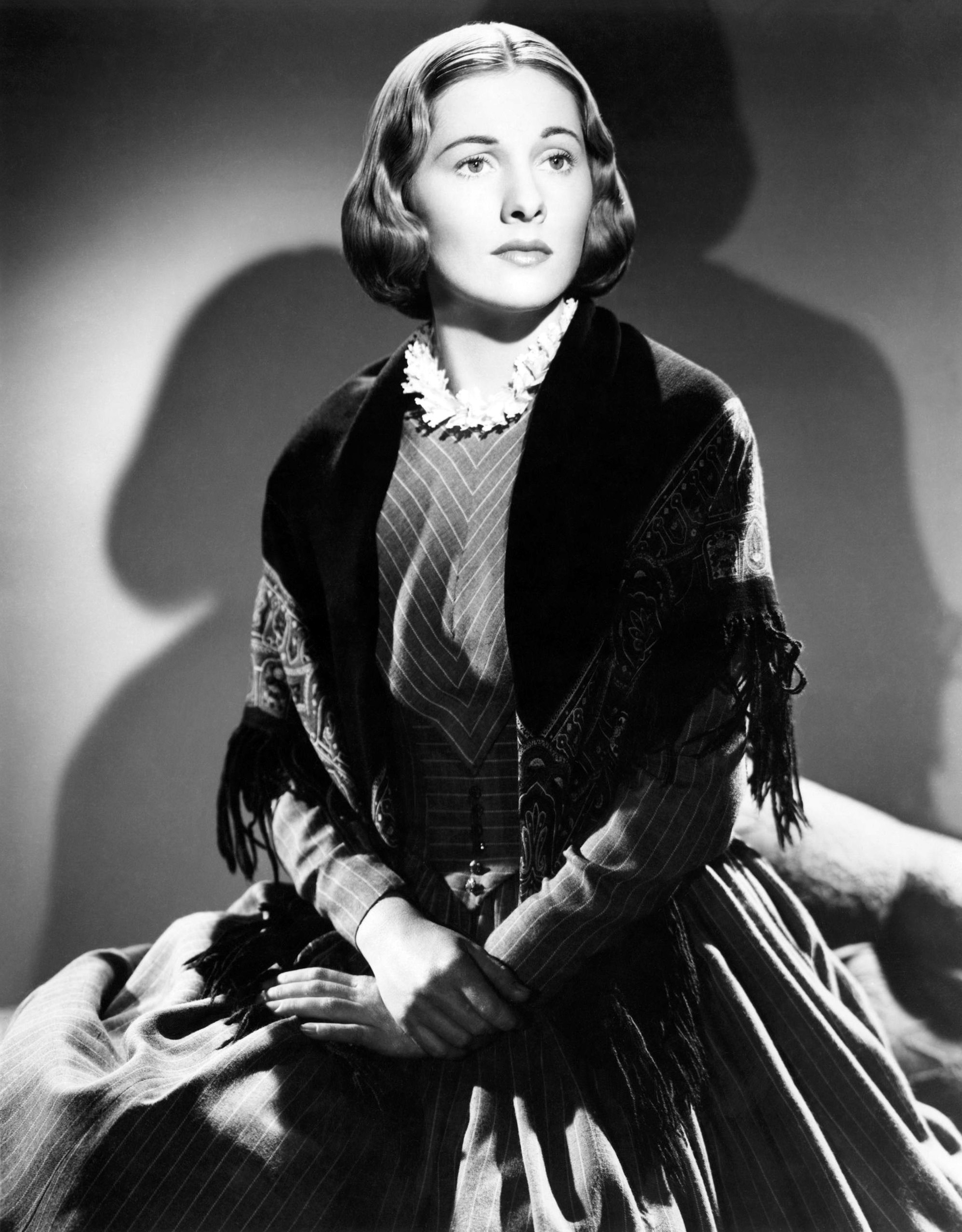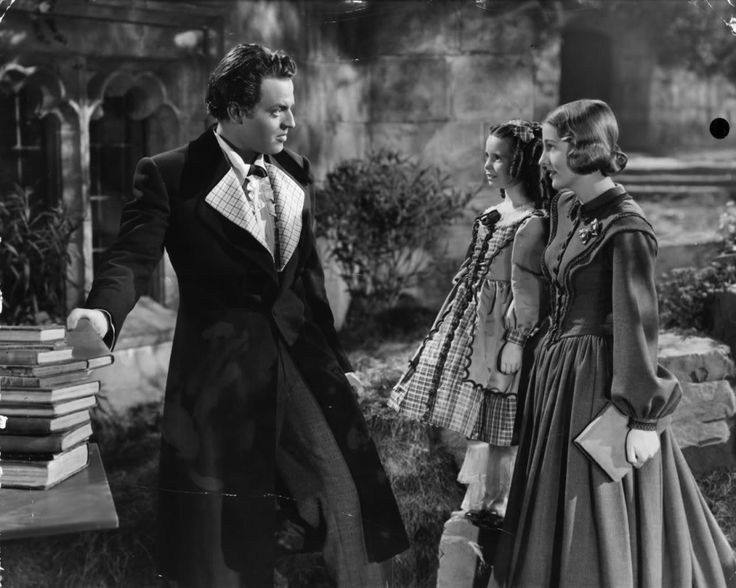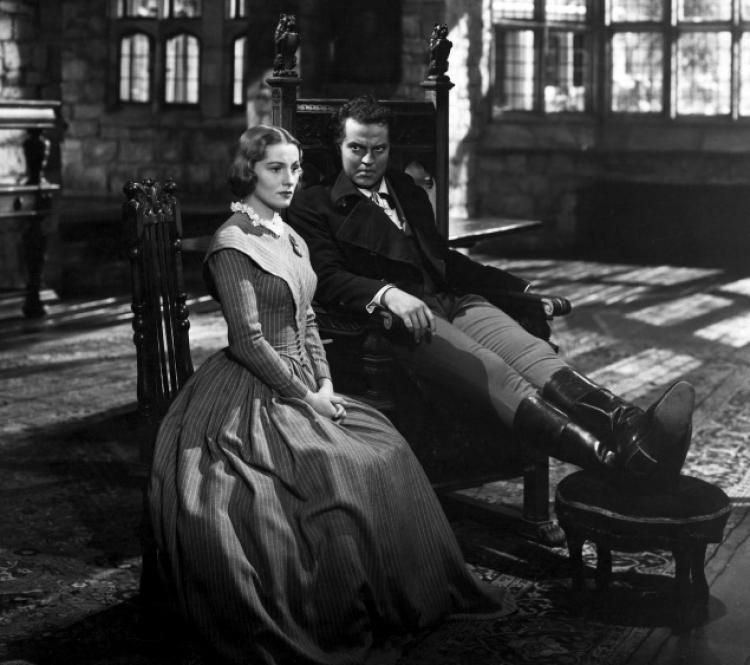Joan Fontaine Centennial: Jane Eyre (1943)
 Sunday, October 22, 2017 at 8:50PM
Sunday, October 22, 2017 at 8:50PM Part two of our Joan Fontaine celebration. Here's Tim Brayton...
 Joan Fontaine's reign at the top of the Hollywood pyramid was short and intense: three out of four movies made in three out of four years netted her Oscar nominations, with a win for the second, Suspicion. We come now to the film made immediately after this golden run: the second talkie adaptation of Charlotte Brontë's 1847 classic Jane Eyre, released in the United Kingdom at the very end of 1943, but held back from the U.S. until February, 1944.
Joan Fontaine's reign at the top of the Hollywood pyramid was short and intense: three out of four movies made in three out of four years netted her Oscar nominations, with a win for the second, Suspicion. We come now to the film made immediately after this golden run: the second talkie adaptation of Charlotte Brontë's 1847 classic Jane Eyre, released in the United Kingdom at the very end of 1943, but held back from the U.S. until February, 1944.
By the time the film arrived at 20th Century Fox, it had already passed through the hands of super-producer David O. Selznick, who had assembled all of the main components in an apparent bid to replicate his Oscar-winning Rebecca. Fontaine appears once again as a delicate, innocent ingénue dropped into a rambling Gothic mansion where a bullying man falls in love with her, in a story whose horror-film atmosphere (courtesy, in both cases, of cinematographer George Barnes) could be given the gloss of prestige and class thanks to the material's literary origins. I will commit an act of grave apostasy by suggesting that Fontaine is better here than she was in that 1940 film; there's a certain toughness in her posture and facial expressions that hadn't much appeared in her screen acting prior to this, and which considerably deepens the "meek virgin" trope she's once again saddled with.
Sometimes, anyway. Jane Eyre, for those of you who've never had the pleasure of reading the book (for my money, it's one of the crown jewels of 19th Century English-language fiction), is the tale of how 20-year-old Jane, after a decade spent in a cruel charity school, takes up a job as governess at Thornfield, a gloomy mansion inhabited by a fragment of the appropriate number of residents and servants. Here, she clashes with the brooding, depressive Edward Rochester, owner of the home and man of the requisite Dark Libertine Past of a 19th Century Gothic romantic lead.
Rochester is a sweeping, overpowering presence on the page and in most every dramatization, and the '43 Jane Eyre might just be the most overpowering of them all. For here, the role was played by associate producer Orson Welles, in the first of what would prove to be many make-work jobs taken on to finance his directorial efforts. By some accounts, and by the obvious onscreen evidence, Welles was quite a hands-on producer (director Robert Stevenson has made many fine movies, including the iconic Mary Poppins 21 years later, but the Wellesian deep staging littered throughout this film was never one of his calling cards). And regardless of how much behind-the-camera force he was bringing to bear on the production, there's no denying the enormous scale of his on-camera personality.

The results are more than slightly frustrating, though weirdly appropriate to the story. Rochester is a domineering figure in Jane's life, and to see Welles running roughshod over Fontaine in their shared scenes does at least tie in to that aspect of the scenario. Fontaine was never one to assertively foreground herself, and she's altogether swamped by Welles's grandiose, hammy melancholy. Laurence Olivier was an overripe scene partner in Rebecca, but Welles is an out-and-out scene thief, hulking in dramatically expressive shots manifestly composed and lit to favor the associate producer over his retiring co-star.
Which is not to say that Fontaine is completely helpless or invisible in the film. As long as she's with literally any other cast member, she's giving an impressively wiry performance that doesn't so much eschew the fragility of Rebecca, Suspicion, and The Constant Nymph, as underlay it with a sense of moral fierceness and a survival instinct that's close enough to Brontë's writing to pass muster, even as this plays more like a feverish (and very short) gloss on the tropes of the novel, rather than a terribly careful adaptation. Fontaine's work with 6-year-old Margaret O'Brien (ebulliently sporting an adorably godawful French accent) is particularly interesting, with Fontaine avoiding the obvious "surrogate mother" or "older sister" approaches to the relationship. There's sentiment here, but it's the sentiment of an interested teacher, with an unexpected coolness and remove.
Even when Fontaine is looking around Welles's imposing shadow, she's still up to something, no matter incapable she is of pulling focus from him. The nervous attraction she implies with her open staring and tightly set mouth is a long way from the adolescent crush of The Constant Nymph, made just months before, and substantial part of the way towards her career-peak work as the title character in 1948's Letter from an Unknown Woman.
It's still a movie that reconceives Brontë's proto-feminist, theologically driven figure as a softer, more passively romantic incarnation of what was clearly, by 1943, "the Joan Fontaine character". And for that reason, it's hard to be completely enamored with the film's goals.

But given what she's been asked to do, and given the gravitational force exerted by her co-star, Fontaine's work in this film is damned impressive, less open and "movie star"-ish than her previous big films, and for that exact reason more unexpected and satisfying in its emphases and emotions.



Reader Comments (5)
Excellent writeup, Tim. Jane Eyre (the book, and the character) is one of my favorites, too, and I think you nailed both what and what doesn't work about this particular take on it. I remember thinking it was better than I was expecting, and yes, Fontaine's performance reminded me of Rebecca, with a shade more self-possession.
Welles was over the top, of course, but you can't stop watching him. And I do think physically he was closer to what Bronte probably imagined for Rochester than most of the other actors I've seen play him since.
This film is my favorite adaptation of Jane Eyre by a mile. I like most of the other versions too, more or less - it's such a wonderful story - but Fontaine and Welles ARE these characters to me.
But... you didn't mention the fantastic score by Bernard Herrmann (yes, another of Orson's regulars), which I think is the best of his early film scores. It helps the film's noir-ish atmosphere enormously, and does much of the dramatic heavy lifting.
And what of the rest of the cast? Henry Daniell, Sara Algood, Agnes Moorhead... little ELIZABETH TAYLOR as poor doomed Helen Burns!
I love this movie.
All I remember from watching this in 8th Grade English class was how much more interesting Elizabeth Taylor was in her small bit part than Joan Fontainezzzzzzz ... sorry waszzzzz .. sorry in her lead rolezzzzzzzz.
I've seen this, "Suspicion", and "Rebecca" and Fontaine, to me, was just dishwater. Dull. Dull. Dull.
Even Fontaine mentioned later how overpowering Welles was not just onscreen but pretty much in every aspect of production.
I think Joan is fine here. She doesn't blow me away but then the story isn't a big favorite of mine so that probably has something to do with it. But how can she compete against Orson who is so perfectly cast and just a POW whenever he's in the frame. He owns this picture.
Yes, Welles is better than most other Rochesters. But he comes dangerously close sometimes to being a Johnny-one-note. There should be a time sooner than in the film when he drops his gruff exterior and lightly moves into a more emotional display of his being truly in love with Jane. Fontaine is really perfect as Jane. She follows Bronte's ink to paper path perfectly. The lighting and other gothic effects are excellent as well